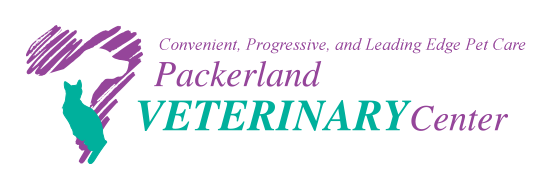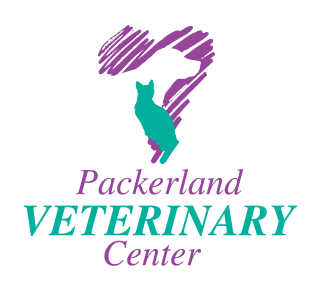


SERVICES
Dentistry

Packerland is dedicated to keeping your pet healthy and happy and dental care is an integral part of that equation. Although preventable, periodontal disease is unfortunately all too common among pets. Dental disease doesn't just cause bad breath, if left untreated, it becomes a source of chronic pain. Even the mildest of dental disease can lead to tooth loss and all of that bacteria can damage the heart, liver and kidneys! Our pets cannot brush their own teeth so it is up to us to provide the care that they need to stay healthy.
Dental Care at Home
The first defense against periodontal disease starts at home. Plaque and bacteria are building up on teeth daily and regular home care can help prevent this from becoming a more permanent and damaging process. Not every pet is going to be accepting of teeth brushing, but starting very slowly and making it a positive experience will help them tolerate it better. And while brushing is best, some pets will be more accepting of other methods of home dental care. Options for home care can include:
Daily Teeth Brushing with a pet-safe toothpaste
See the video for more info. Be sure to choose a toothpaste flavor your pet is likely to enjoy; poultry is generally a favorite.
Dental foods
Hills t/d or Purina DH are specially designed to help reduce and prevent dental disease when used regularly.
Daily dental chews/treats
Look for the VOHC seal on the packaging to ensure the product has been tested and proven to help eliminate plaque and tartar.
Daily mouth rinses
Similar to mouthwash, they work to reduce bacteria in the mouth, but these are safe for pets to ingest.
At home Sealant kits
Can help maintain a barrier against plaque and calculus formation with weekly application.
Water additives
Can be added to the pet's water to help reduce bacteria in the mouth.
Dental Care in the Clinic
Your pet's oral health will be examined by your veterinarian at their regular preventative care visits. During an exam, we inspect the teeth and gums as closely as your pet will allow, looking for signs of disease or areas of concern. From there, we make recommendations which may include specific home care ideas or even a professional dental cleaning here at the clinic. Having your pets teeth cleaned regularly will help prevent advanced periodontal disease and the damaging effects associated with it.
Dental Cleanings
Just like you need your teeth cleaned regularly, your pet does too! Unfortunately, pets won't sit still, hold their mouths open, and spit in the dentist chair so we need to anesthetize them for the procedure. This allows us to be efficient and get a comprehensive exam and a thorough cleaning accomplished. Anesthesia can be a scary topic, particularly for families with older pets, but the majority of the dental cleanings we perform are on our oldest patients as they often require the most care! While we cannot eliminate the risk of anesthesia, we do take many steps to minimize those risks.
Prior to any anesthesia, we perform pre-anesthetic bloodwork. This helps us catch any underlying concerns that may impact the safety of our procedure and allows us to cater anesthetic protocols to each patient individually. Our patients receive IV fluid therapy to help flush the system of medications and provide direct access in case of emergency. Once anesthetized, each patient is monitored closely by a technician who is trained to catch any abnormalities before they become a problem. Following the procedure, patients are monitored by the recovery technician until they are up, walking and ready to head back to ICU to await discharge.
The actual procedure itself has many aspects. Like your dental hygienist, our trained technician staff is responsible for the scaling and polishing of the teeth and applying fluoride and sealant treatments as well as taking dental radiographs. The veterinarian then steps in to examine the teeth and gums, looking for any abnormalities or areas of concern. Dental radiographs allow them to look below the gumline, which gives them a more complete picture of dental health. Dental radiographs help find things like tooth fractures, abscesses, bone loss and root abnormalities that may not otherwise be found on visual exam. This gives our veterinarians the ability to make the best recommendations for your pet. In the event your pet needs further care during it's cleaning, you will receive a call which will detail our recommendations. Our veterinarians are trained in many advanced procedures to help treat periodontal disease.
Your pets are members of the family and we are here to provide the same care for your furry members that you would expect for yourself. Our end goal is always to ensure your pet will be comfortable and healthy for the long term. Please contact our staff if you have any additional questions or would like to schedule an oral exam for your pet.



